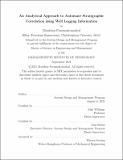An Analytical Approach to Automate Stratigraphic Correlation using Well Logging Information
Author(s)
Parimontonsakul, Monthep
DownloadThesis PDF (16.80Mb)
Advisor
Williams, John
Rubin, Joan
Terms of use
Metadata
Show full item recordAbstract
Stratigraphic correlation is an essential process and is a prerequisite to several processes in the industry. It is a tedious and time-consuming work process that prevents geoscientists from performing other relevant tasks and becomes a bottleneck to other workflows. With the rapid growth in digital technology, the age of digital transformation becomes a key enabler to automate the correlation by applying the data analytic framework to formulate and solve the problem.
This thesis aims to address and emphasize an opportunity to create a computer-assisted and potential process automation to overcome the cumbersome stratigraphic correlation problem. It integrates a system thinking and an analytical thinking concept to a problem formulation. The step comprises involving the right stakeholders and beneficiaries, identifying needs and use cases, and understanding the problem at hand and its consequences. Three analytical problems are formulated and investigated, corresponding to various use cases.
The machine learning pipeline is developed as a foundation in the data analytic model, intending to automate the model implementation and extract insights. As a result, this thesis emphasizes the power of different analytical formulations to the implication and interpretation of the model. The analytical formulation employing the marker horizon identification concept performs significantly better than other formulations. The model reveals insights, especially on the information geoscientists need to focus on during the correlation analysis and unveils a path to automate the stratigraphic correlation task.
Date issued
2021-09Department
System Design and Management Program.; System Design and Management Program.Publisher
Massachusetts Institute of Technology